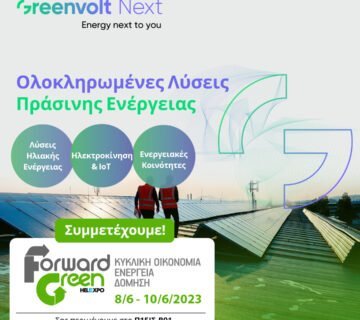Energy transition has sparked demand for solutions that minimize the energy footprint of businesses and so, the Greek green energy market attract new players. This background includes the start of operations in Greece by the Portuguese Greenvolt Group, which cooperates with Globalsat Group, offering integrated energy solutions for businesses.
Greenvolt decided that Greece will be the 4th European country in which the Group will expand. Ruben Carvalho, Managing Director of Greenvolt Next Greece talks to Moneyreview.gr about that expansion in Greece.
«Greenvolt operates in the field of Renewable Energy Sources, providing 100% green energy through a variety of technological solutions. We produce energy from residual biomass, promote large-scale wind and energy projects, while remain concentrated to distributed solar energy production, both for self consumption and through the ”energy communities” concept.
And that, not only with the aim of gaining cheaper energy, but also for purely environmental parameters related to our pursuit to coσntribute to the weaning of the economy from carbon. Moreover, the Greek government is committed to strengthen the energy production according to REPower EU. There are also clear incentives to invest in renewable energy sources, specifically in terms of distributed generation solutions for self consumption from businesses, where Greenvolt has expertise, Carvalho explains.
PPAs solution
«We bring in the Greek market an ability of excellent planning and execution, being able to meet the challenges of offering products and services. Moreover, ”we are able to offer companies the ability to add value of RES, without the need of for an initial investment” he added.
Ruben Carvalho considers the solution of of bilateral power purchase agreements (PPAs) aa a comparative advantage. It is an ”innovative business model that the company is the first to introduce in the Greek market and can differentiate the the market of self consumption solar panels”.
«Through that model, Greenvolt Next fully undertakes the licensing, study, design, installation, maintenance of PVs, all operational costs, project risk as well as financing, without any investment form the corporate customers’ side. The company stays focused to its own subject and goal and enjoys the benefits of operating a photovoltaic system on its premises.
Moreover, it reduces its electricity grid dependence, achieves a reduction on regulatory fees on the electricity bill, increases the value of its fixed assets, reduces its environmental footprint and finally contributes to its energy transformation and to a more sustainable world. By producing energy through PV solar, which are installed in the building or company’s plot, the company produces its own energy and at the same time saves on the electricity bill” he explains.
Energy communities
Referring to energy communities, the managing director of Greenvolt Next Greece notes that there is a great potential for the development of distributed production in the Greek market, both for companies and individuals.
«From companies’ side there is a great demand for self consumption solutions that we offer, recognizing the economical and environmental benefits. Small and medium size businesses also show a strong demand for clear energy sources. One of the incentives of distributed energy production is the usage of existing infrastructure (e.g. buildings, offices, crafts, factories). We leverage the customer’s infrastructure to install the solar power source. However, for customers where available space for a solar installation is a challenge, solar communities are the optimal solution because the neighbor shares the excess solar energy. What is needed is clear legal framework regarding energy communities that will allow their development and respond to physical limitations of distributed generation”.
As he says, Greece has already a history in the development of RES communities, from 2018, when the relevant legislation was drawn up. Following, from 2022 the energy communities have gained new momentum with the entry of companies that promote renewable energy sources in this sector. «This step made the creation of energy communities faster, allowing to people and more specific families, to benefit more quickly from all related benefits. The model that Το μοντέλο που determined by Greek authorities and is being transforming in the context of new Law promoted by the Ministry of Internal Affairs for the integration of Directive (EU) 2018/2001, although with differences compared to what is observed in some European countries ,it is what, in our view, ensures the fast development of these communities, allowing the country to make huge steps towards the goals set for 2023”.
The energy transition bet
But what progress are Greek companies recording, in terms of energy transition?
Such as in other European countries, big size businesses have realize the benefit of renewable energy sources, while small and medium size needs more time to realized the previous fact. «Considering the fast rise in energy prices last year, we noticed a significant rise in demand of RES solutions. There is increased demand, from large companies for bilateral power purchase agreements (PPAs), that are now also attracting the interest of smaller companies. Among, SMEs, the bet on self consumption is very important: it is seen as the answer in higher energy prices and the increasing pressure θεωρείται to make the great leap to the energy transition and zero emissions”, he says.
For self consumption with net-metering, ο Ruben Carvalho notes that in Greece, net metering allows the consumer to cover a serious part of consumed energy, using a connected photovoltaic system. Meanwhile, makes it possible to use a public electricity grid to indirectly store the green energy produces by consumer’s PV solar system.
“The promoted new draft law of the Ministry of the Interior, which foresees the possibility of selling the surplus produced energy, offers additional possibilities to companies about the utilization of self consumption photovoltaic systems and drives the market into a new era of of photovoltaic solutions and collectors that are connected to batteries”, he finalizes.




